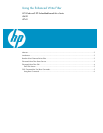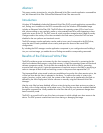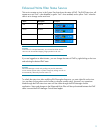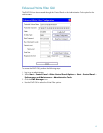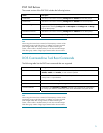
5
EWF GUI Buttons
The current version of the EWF GUI includes the following buttons:
Button Description
Enable EWF
This button is the same as executing ewfmgr.exe c: -Enable from the DOS prompt.
Disable EWF
This button is the same as executing ewfmgr.exe c: -Disable from the DOS prompt.
Overlay Configuration
This button simply displays the Overlay information and is a combination of the information
supplied when executing ewfmgr.exe c: -Description and ewfmgr.exe c: -Gauge
from the DOS prompt.
Clear Boot Command
This button is the same as executing ewfmgr.exe c: -NoCmd from the DOS prompt.
Commit Data to Volume
This button is the same as executing ewfmgr.exe c: -Commit from the DOS prompt.
Note
When using the Commit boot command, all the temporary contents will be
permanently written to the flash memory. In addition, all content accessed
(and changes made) after running Commit, but before rebooting the
system, will be written to the flash memory as well. This includes changes
made during any number of login/logout sessions before the next reboot.
DOS Command-line Tool Boot Commands
The following table lists the EWF boot commands that are supported.
Boot Command Description
All
Displays information about all protected volumes and performs a command, such as
disable, enable, and commit, on each volume if specified.
Commit
Commits all current level data in the overlay to the protected volume, and resets the current
overlay level to 1 upon shutdown.
Disable Allows user to write to the image after the next reboot.
Enable Prevents the user from writing to the image after the next reboot.
Commitanddisable
Combination of the Commit and Disable commands. This command will commit data in
the overlay upon shutdown. Additionally, EWF will be disabled after the system reboots.
Note
When using the Commit boot command, all the temporary contents will be
permanently written to the flash memory. In addition, all content accessed
(and changes made) after running Commit, but before rebooting the
system, will be written to the flash memory as well. This includes changes
made during any number of login/logout sessions before the next reboot.



